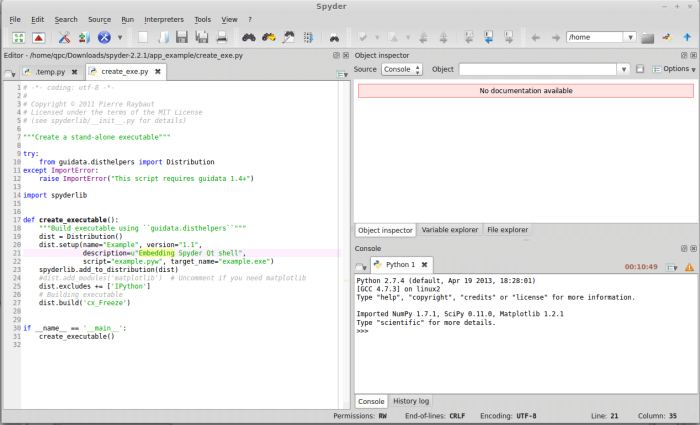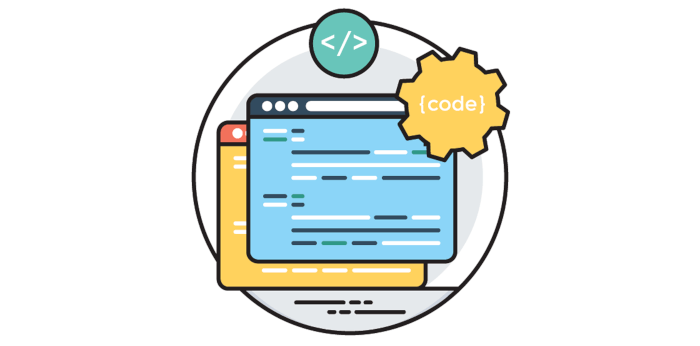Last Updated on September 22, 2023
Spyder (previously known as Pydee) is an open-source Python development environment providing MATLAB-like features in a simple and light-weighted software.
Spyder is part of spyderlib, a Python module based on PyQt, pyflakes, rope and sphinx providing powerful PyQt4 widgets like source code editors, Python console (easy to embed in your own application: see this example) or GUI-based dictionary, lists/tuples and NumPy array editors.
This project is part of a larger effort to promote and facilitate the use of Python for scientific and engineering software development. The popular Python distributions Python(x,y) and WinPython also contribute to this plan.
Features include:
- Syntax coloring for Python, C/C++ and Fortran files.
- Powerful dynamic code introspection features (powered by rope):
- Code completion and calltips.
-
- Go to an object definition with a mouse click.
- Class and function browser.
- Occurrence highlighting.
- To-do lists (TODO, FIXME, XXX).
- Get errors and warnings on the fly (provided by pyflakes).
- Breakpoints and conditional breakpoints to use with the python debugger (pdb).
- To easily interact with your code as you progress, Spyder lets you.
- Open as many Python and Ipython consoles as you want.
- Run a whole script or any portion of it from the Editor.
- Have code completion and automatic link to documentation through the Object Inspector.
- Execute all consoles in a separate process so they don’t block the application.
- With the Variable Explorer you can browse and analyze all the results your code is producing, and also.
- Edit variables with Spyder’s Array Editor, which has support for a lot of data types (numbers, strings, lists, arrays, dictionaries).
- Have multiple Array Editors open at once, thus allowing to compare variable contents.
- Import/Export data from/to a lot of file types (text files, numpy files, Matlab files).
- Generate 2D plots of list and arrays.
- View local variables while you’re debugging.
- Quick access to documentation is a must for every programmer, either to explore new libraries or to remember how to use a piece of code. Spyder gives you the docs in three different formats:
- Rich text (powered by Sphinx).
- Plain text, to use when rich text is not working.
- Source code, to look at the internal implementation.
- History log.
- Array editor.
- Project explorer.
- Pylint integration.
Website: github.com/spyder-ide/spyder
Support:
Developer: Pierre Raybaut – Developed and maintained by the Spyder Development Team
License: MIT License

Spyder is written in Python. Learn Python with our recommended free books and free tutorials.
Return to Python IDEs | Return to Integrated Development Environments
| Popular series | |
|---|---|
| The largest compilation of the best free and open source software in the universe. Each article is supplied with a legendary ratings chart helping you to make informed decisions. | |
| Hundreds of in-depth reviews offering our unbiased and expert opinion on software. We offer helpful and impartial information. | |
| The Big List of Active Linux Distros is a large compilation of actively developed Linux distributions. | |
| Replace proprietary software with open source alternatives: Google, Microsoft, Apple, Adobe, IBM, Autodesk, Oracle, Atlassian, Corel, Cisco, Intuit, SAS, Progress, Salesforce, and Citrix | |
| Awesome Free Linux Games Tools showcases a series of tools that making gaming on Linux a more pleasurable experience. This is a new series. | |
| Machine Learning explores practical applications of machine learning and deep learning from a Linux perspective. We've written reviews of more than 40 self-hosted apps. All are free and open source. | |
| New to Linux? Read our Linux for Starters series. We start right at the basics and teach you everything you need to know to get started with Linux. | |
| Alternatives to popular CLI tools showcases essential tools that are modern replacements for core Linux utilities. | |
| Essential Linux system tools focuses on small, indispensable utilities, useful for system administrators as well as regular users. | |
| Linux utilities to maximise your productivity. Small, indispensable tools, useful for anyone running a Linux machine. | |
| Surveys popular streaming services from a Linux perspective: Amazon Music Unlimited, Myuzi, Spotify, Deezer, Tidal. | |
| Saving Money with Linux looks at how you can reduce your energy bills running Linux. | |
| Home computers became commonplace in the 1980s. Emulate home computers including the Commodore 64, Amiga, Atari ST, ZX81, Amstrad CPC, and ZX Spectrum. | |
| Now and Then examines how promising open source software fared over the years. It can be a bumpy ride. | |
| Linux at Home looks at a range of home activities where Linux can play its part, making the most of our time at home, keeping active and engaged. | |
| Linux Candy reveals the lighter side of Linux. Have some fun and escape from the daily drudgery. | |
| Getting Started with Docker helps you master Docker, a set of platform as a service products that delivers software in packages called containers. | |
| Best Free Android Apps. We showcase free Android apps that are definitely worth downloading. There's a strict eligibility criteria for inclusion in this series. | |
| These best free books accelerate your learning of every programming language. Learn a new language today! | |
| These free tutorials offer the perfect tonic to our free programming books series. | |
| Linux Around The World showcases usergroups that are relevant to Linux enthusiasts. Great ways to meet up with fellow enthusiasts. | |
| Stars and Stripes is an occasional series looking at the impact of Linux in the USA. | |
